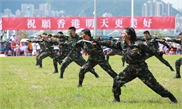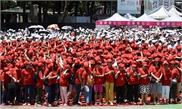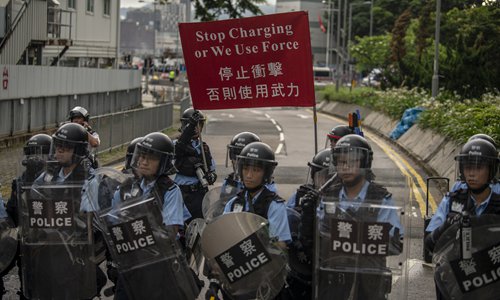
Police officers are seen holding up a red flag in Hong Kong, China on July 1, 2019. (Photo: Vernon Yuen/NurPhoto/AFP)
More than 160,000 Hong Kong residents gathered Sunday to show their support for the police who enforced the law, ensuring security and stability in Hong Kong.
Tang King-shing, former police commissioner of the Hong Kong Special Administrative Region (SAR) was also present.
In an exclusive interview with the Global Times, Tang said the police were accurate to call the actions of the radical activists protesting the extradition bill a "riot."
It is no longer a matter of amending the bill, Tang explained, noting that someone had used "anti-extradition" as an excuse to damage the administrative ability of the Hong Kong regional government and police.
Tang, who was known for his style and good looks, was the inspiration for the lead character in Cold War, a well-known Hong Kong crime film.
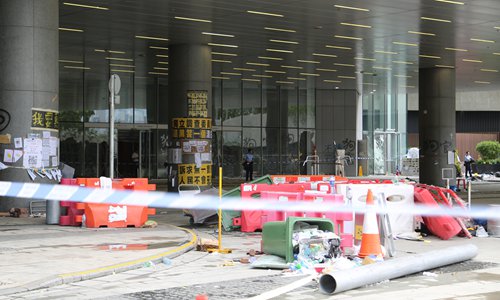
Tang said during the rally he was heartbroken when heard police headquarters was sieged. He also said Sunday's assembly the most peaceful and restricted one since, and an example of how every Hong Kong resident should behave.
Tang told the Global Times that he did not start the police support rally. However, as one of the conveners of Safeguard HK, Support the Surrender of Fugitive Offenders Legislation, an alliance which supports the amendment of the extradition bill, he wanted to send a clear message to the Hong Kong police, "They are not alone; behind them, there are many Hong Kong residents who care for them, and support them to fulfill their duties."
He also said that Sunday was chosen to hold the rally because it was convenient for residents.
Roughly 165,000 gathered Sunday afternoon at Tamar Park to show their support for the police. At one point in the afternoon, attendance had reached 53,000.
"Honestly, I saw many people who wanted to support the police at the rally's site, but the park wasn't big enough. Many people had to stand far away from the area. Many others could not make it because they had to work or had prior engagements. Actually, the number of residents who support the police is huge," said Tang.
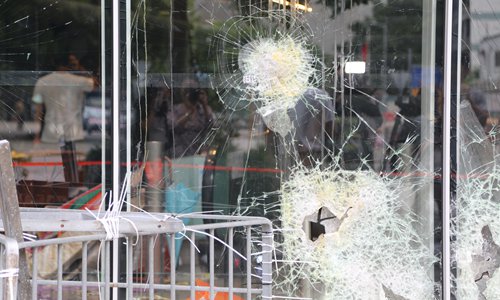
The Hong Kong LegCo Complex was terribly damaged by the violent protestors on July 1 and now the police continue to safeguard the venue as social order is slowly returning to normalcy on July 2. (Photo: Chen Qingqing/GT)

Photo: AFP
The protestors claimed "one or two million" had joined their protest. But Tang said that number was just a casual reference.
"There's no need to compare numbers. Some Hong Kong media, especially western media, tend to use those numbers (made up by protestors), which is very unfair. Yet being willing to believe this 'fact' shows that they are just playing dumb," said Tang.
Tang said the Hong Kong police shouldered the work pressure. Compared with those who attack police via illegal methods, the number of police who are maintaining order is small.
Outside of the riots, police also have had to ensure security within Hong Kong society.
"Many police worked overtime, but they needed to stay alert during the extreme hostile environment because some threatened them with their family members' safety," he said, noting that even injured police officers were treated poorly at a few hospitals.
Retired police offered their help, and a few groups voluntarily provided food for the police. However, such efforts hardly relieve pressure for those who serve at the front-lines, said Tang.
Activists sieged the Legislative Council on June 12, and were a serious threat to public security. Later, the police described the protest as "riot." Many protestors later called upon authorities to redact the term "riot" in an attempt to incite more rioting.
Tang pointed out that the word "riot" was not in reference to every resident who joined the demonstrations, but specifically aimed at a few whose violent acts reached riot levels.
"So, I support this definition," said Tang.
Some protestors asked for amnesty, revealing how they had forgotten about Hong Kong laws and procedures, said Tang.
Normally, amnesty comes after a hearing and conviction. However, the protestors' behavior has yet to go through legal proceedings, so amnesty is impossible, even the chief executive doesn't have the power to do that, Tang explained.
The protestors imposed their wish to the government, but the government is unlikely to make such arrangement, said Tang, noting that their concerns reveal a guilty conscience.
After several weeks of observation, Tang remains suspicious of the claim that "residents willingly join the protest."
"From protection equipment to water and food, their every move was well-prepared; every move was unified and well-planned. It is unlikely the youngsters planned this. It is not hard to imagine arrangements were made behind the scenes. I also heard that the limit for members in the messaging apps used by the protestors was very high. Such designs are very convenient for them," Tang noted.
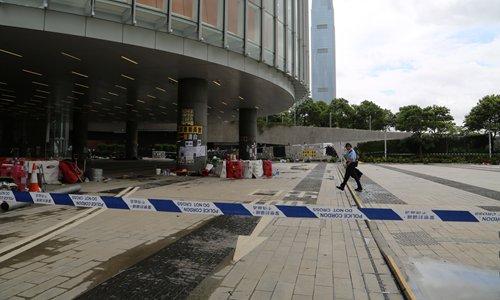
The Hong Kong LegCo Complex was terribly damaged by the violent protestors on July 1 and now the police continue to safeguard the venue as social order is slowly returning to normalcy on July 2.(Photo: Chen Qingqing/GT)
"Hong Kong police were always supported and admired by the public during their ordinary operations in maintaining social order. As I said yesterday, 'have we forgotten that the Hong Kong police force is the best in Asia?'
Throughout the past three decades, we have always pursued the goal of making Hong Kong one of the safest cities in the word," said Tang.
Tang was outspoken with his views on how some media outlets provided inaccurate and impartial reports.
"The media was complaining whether it should be defined as a 'riot,' and were always asking why police were doing this, but avoided talking about the protestors' behavior. This was unfair to society as a whole," Tang said.
Although the government suspended the extradition amendment, protestors kept making new requests. When asked how he felt about the amendment, Tang insisted that it was right.
"However, this problem is not about the extradition bill anymore. [Violent] protest against the extradition bill has become an excuse for some people. They are still using the illegal method of 'Occupying Central,' and tried to use them to damage the administrative ability of Hong Kong government and police," Tang said.
